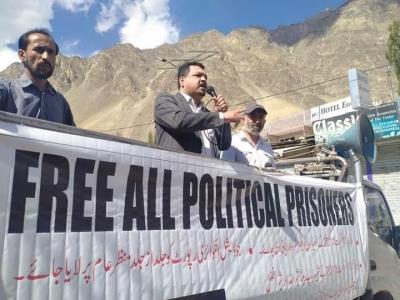
Fed Up With Pakistan, People Of Gilgit-Baltistan Yearn For Justice And Right To Decide Own Future
According to a report published by the Washington-based Middle East Media Research Institute (MEMRI), people regularly hold protest in Pakistan-occupied Gilgit-Baltistan, with residents usually braving freezing temperatures to demand land rights, oppose unjust taxation, long power outages and encroachment of projects like China Pakistan Economic Corridor (CPEC) that seize local land without providing compensation.
PoGB has been administered through decrees and presidential orders, denied representation in the National Assembly, and excluded from the constitutional framework that defines the rest of Pakistan, the research institute highlighted
"This legal ambiguity originates from the Karachi Agreement of 1949, which transferred control of Gilgit-Baltistan to Pakistan without a single representative from the region. Pakistan's governance model in PoGB demonstrates colonial mindset, prioritising central control over participatory development," the MEMRI report detailed.
Once described as "the last colony", the pressing demands of residents of Gilgit-Baltistan continue to be ignored by the mainstream political parties of Pakistan. Residents in Skardu, which is the largest city of PoGB experiences 22 hours of load shedding in winter, relying on underperforming hydroelectric projects like the Satpara Dam, which was made to generate electricity in 40,000 homes but delivers only a fraction of its promise. The region also remains disconnected from the national grid.
Protests erupt regularly in the region with the people demanding land rights, oppose unjust taxation, and resist the encroachment of federal projects like CPEC. People have expressed anger over the GB Revenue Authority Bill, which imposes taxes without offering representation. People of PoGB neither have voting rights in national elections nor do they have any voice in making the policies that govern their lives, as per the report.
PoGB continues to remain under Pakistan's self-governance orders that has powers in the federal government while local institutions remain toothless, triggering growing demand for constitutional rights, political recognition, and genuine autonomy.
Activists like Shabir Choudhry, stated MEMRI report, have warned that the region is teetering on the edge of chaos. With each passing year, the protests grow louder and the grievances deeper. People of Gilgit-Baltistan are yearning for justice, dignity, and the right to determine its own future, according to the report.
The people of PoGB were not even consulted when Pakistan reached a border agreement with China in 1963, in which it ceded a part of its territory south of the Mintaka Pass, land historically belonging to Hunza to Beijing, as per the report. Furthermore, the construction of the Karakoram Highway which connects Pakistan and China through Gilgit-Baltistan has facilitated the unchecked influx of weapons, narcotics, and religious militias into the region. These developments have destabilized the social fabric and caused a dramatic shift in the region's demographic, the report mentioned.

Legal Disclaimer:
MENAFN provides the
information “as is” without warranty of any kind. We do not accept
any responsibility or liability for the accuracy, content, images,
videos, licenses, completeness, legality, or reliability of the information
contained in this article. If you have any complaints or copyright
issues related to this article, kindly contact the provider above.


















Comments
No comment